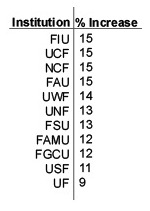Mariella Roque/ Staff Writer
Representatives from the eleven Florida public universities within the State University System attended the Florida Board of Governors meeting this past week in Orlando, where FIU was approved a tuition increase that places it first in the state in tuition cost.
Out of eight universities that originally requested a full 15 percent increase in differential tuition, only four were approved. Among these was FIU with a vote of 10-6 in favor, the highest votes in favor for any of the four.
“Now that the primary source of income of the Public Universities is student tuition and fees, the student now squarely bears the burden that the state legislature and the people of Florida in general, should bear,” said MMC-SGA Vice President Alex Castro in a press release.
The increase amounts to $608.70 a year for a student taking 30 credit hours.
According to FIU’s Chief Financial Officer Kenneth Jessell, with this increase, FIU will be able to admit an additional 1,700 undergraduates and provide $6 million in need-based financial aid.
Differential tuition only applies to undergraduate students and 30 percent of it is used to provide financial aid. Unlike base tuition that is set by the Florida Legislature and approved by the governor, differential tuition can be pursued by the Board of Trustees of a university and then approved by the Board of Governors.
On Thursday, the Board approved the Capital Improvement Fee increases, with FIU and nine other universities requesting $2 increases, UNF an increase of $1.38 and FSU abstaining.
The Board made an emphasis on the Free Application for Federal Student Aid, encouraging university students to fill out the form early in order to receive maximum amount of aid.
“It is to the student’s benefit to complete a FAFSA as soon as possible, since some aid is generally on a ‘first come, first served’ basis, especially with limited federal dollars available for disbursement,” said Board spokeswoman Kelly Layman.
While the three-day proceedings primarily focused on requests for tuition and fee increases, each university also presented a 3-Year Work Plan before the Board.
Although this is the third year that universities are required to present a Work Plan, this is the first in which they must follow a “Board template report for presentation consistency.”
The template is divided into three sections: strategy, which includes the university’s mission, strengths and key initiatives and investments; key performance, indicators such as the university’s goals and operations; and the university’s fiscal information, including the tuition differential fee request and enrollment planning.
FIU presented its plan Tuesday afternoon and received positive feedback, according to FIU’s SGA President Laura Farinas.
“Our focus was on FIU’s successes and growth moving forward,” Farinas said. “After the presentation we had many positive remarks about those on the Board. They commented that they thought it was very entertaining, informative, and impressive.”
All university Work Plans were approved, although the Board requested Florida A&M University to return in September “with additional information on a plan for improving student graduation rates and retention rates, and information to address financial aid and student debt.”
The Board of Governors is made up of 17 members, 14 assigned by the governor of Florida. Its mission is to “govern and advance the State University System of Florida.”
The Board appointed two new trustees to their respective University Board of Trustees; Cleve Warren to FAMU and George Skestos to New College of Florida. Cortez Whatley was also welcomed as a new student representative joining the Board of Governors.







Be the first to comment on "Board of Governors approves tuition increase, FIU ranks first in tuition cost"